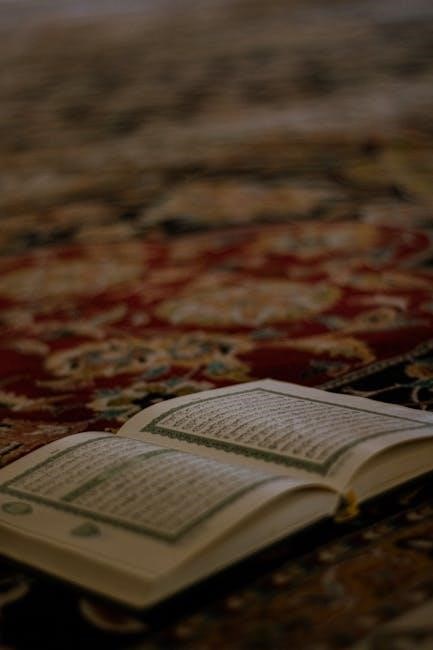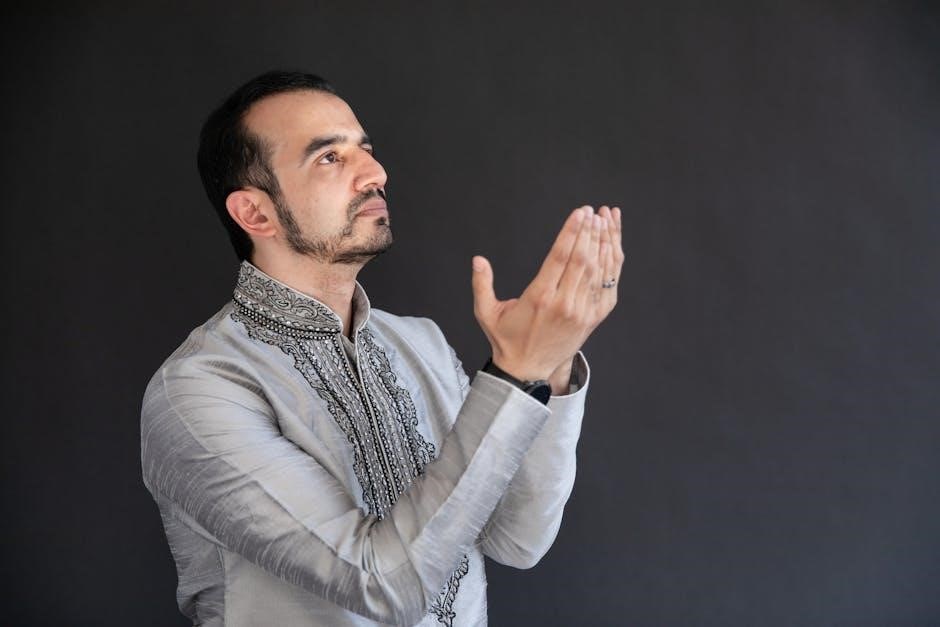
dua arafah pdf
Dua Arafah is a sacred prayer recited on the Day of Arafah, a pivotal moment in the Islamic calendar. It is a time for seeking forgiveness, mercy, and spiritual growth. The prayer, often available in PDF formats, includes supplications from Imam Hussain (A.S) and Imam Sajjad (A.S), offering guidance for believers. Reciting Dua Arafah strengthens one’s connection with Allah and is a powerful means of attaining divine blessings and pardon.
What is Dua Arafah?
Dua Arafah is a sacred supplication recited on the Day of Arafah, the 9th of Dhul Hijjah. It is a heartfelt prayer seeking Allah’s forgiveness, mercy, and blessings. The dua, often available in PDF formats, includes supplications from esteemed figures like Imam Hussain (A.S) and Imam Sajjad (A.S). These prayers are rich in spiritual depth, expressing devotion, gratitude, and humility. The Dua Arafah PDF serves as a comprehensive guide, offering Arabic text, transliterations, and English translations, making it accessible to all. It is a powerful tool for connecting with Allah, emphasizing themes of repentance, divine love, and the pursuit of spiritual growth. The PDF format ensures ease of access and recitation for believers worldwide.
Significance of the Day of Arafah in Islam
The Day of Arafah holds immense spiritual significance in Islam, marking a pivotal moment in the Hajj pilgrimage. It is celebrated on the 9th of Dhul Hijjah, the Islamic month of pilgrimage, and is a day of divine mercy and forgiveness. Pilgrims gather at Mount Arafah, a site of profound historical and religious importance, to seek Allah’s blessings and pardon. The day is also observed by non-pilgrims worldwide through fasting and supplications. Dua Arafah PDF resources highlight the day’s importance, emphasizing its role as a time for spiritual reflection, repentance, and reconnecting with Allah. The collective gathering of believers on this day symbolizes unity and the universal quest for divine grace.

History and Background
Dua Arafah traces its origins to the Day of Arafah, a cornerstone of Islamic tradition for centuries, associated with key historical events in the Hajj pilgrimage.
Origins of Dua Arafah
Dua Arafah, rooted in Islamic tradition, is a sacred supplication linked to the Day of Arafah, a pivotal moment in the Hajj pilgrimage. It is believed to have originated from the Prophet Muhammad (peace be upon him), who emphasized the spiritual significance of this day. The dua is particularly associated with Imam Hussain (A.S), who is said to have recited heartfelt prayers on Mount Arafah, seeking divine mercy and forgiveness. Over time, scholars and religious leaders compiled these supplications into structured prayers, which are now widely recited by Muslims worldwide on this blessed day. The origins of Dua Arafah reflect its deep connection to Islamic history and spirituality.
Importance of Arafah in Hajj Rituals
Arafah holds immense significance in the Hajj pilgrimage, as it is the most critical day of the rituals. The Wuquf (standing) at Arafat is obligatory for all pilgrims, symbolizing unity and equality before Allah. It is the pinnacle of the Hajj journey, where pilgrims gather on Mount Arafah to seek forgiveness and mercy. The Prophet Muhammad (peace be upon him) emphasized that Hajj is Arafah, underscoring its centrality. The day is a powerful reminder of the Day of Judgment, urging pilgrims to reflect on their deeds and seek divine pardon. The rituals performed on Arafah are designed to cleanse the soul, making it a transformative experience for those who observe them with sincerity and devotion.

Recommended Prayers for the Day of Arafah
Reciting Dua Arafah and other sacred supplications is highly recommended. Pilgrims and non-pilgrims alike are encouraged to engage in heartfelt prayers, seeking forgiveness, mercy, and divine blessings.
Key Duas to Recite on Arafah Day
The Day of Arafah is a time for profound supplication, and certain duas are highly recommended. The most significant is Dua Arafah itself, a lengthy prayer narrated by the Prophet (PBUH) and emphasized by the Ahlul Bayt. This du’a is known for its depth and spirituality, focusing on seeking forgiveness, divine mercy, and closeness to Allah. Additionally, other key supplications include Dua Nudba, Dua Sabah, and Dua Kumayl, which are often recited on this sacred day. These prayers highlight themes of repentance, gratitude, and the desire for spiritual growth. Reciting them with sincerity and focus is believed to amplify their blessings and acceptance.
Prayers from Imam Hussain (A.S) and Imam Sajjad (A.S)
Imam Hussain (A.S) and Imam Sajjad (A.S) are revered for their profound supplications, particularly on the Day of Arafah. Imam Hussain’s prayers are filled with expressions of humility and devotion, while Imam Sajjad’s supplications, such as Dua Arafah, are renowned for their depth and emotional resonance. These prayers emphasize themes of repentance, divine mercy, and the pursuit of spiritual growth. They serve as a guide for believers to connect with Allah on this sacred day; The PDF resources containing these prayers often include the Arabic text, transliterations, and translations, making them accessible for recitation. Reciting these prayers with sincerity is believed to bring immense spiritual rewards and draw one closer to Allah.
Transliterations and Translations for Easy Recitation
Dua Arafah PDF resources often include transliterations and translations to facilitate easy recitation for those unfamiliar with Arabic. These resources provide the original Arabic text alongside Romanized transliterations, helping believers pronounce the words correctly. English translations are also included to ensure a deeper understanding of the supplications. By offering these features, the PDFs make Dua Arafah accessible to a wider audience, allowing individuals to focus on the spiritual significance of the prayers. This inclusive approach ensures that everyone, regardless of their linguistic background, can engage with the beautiful words of Imam Hussain (A.S) and Imam Sajjad (A.S) on the Day of Arafah.

Benefits of Reciting Dua Arafah
Reciting Dua Arafah brings spiritual rewards, forgiveness, and strengthens one’s bond with Allah. It is a time when supplications are more readily accepted, offering profound blessings and mercy.
Spiritual Rewards and Forgiveness
Dua Arafah is a powerful means of seeking spiritual rewards and forgiveness. Reciting it on the Day of Arafah is believed to wash away sins and bring divine mercy.
The Prophet Muhammad (PBUH) emphasized that Arafah is a day of forgiveness, where Allah grants pardon to those who sincerely repent and supplicate.
By reciting Dua Arafah, believers experience spiritual cleansing and a strengthened connection with Allah, making it a vital practice for seekers of divine grace and mercy.
The prayer’s words, steeped in humility and devotion, highlight Allah’s attributes of forgiveness and compassion, offering hope for spiritual renewal and liberation from past mistakes.
Strengthening the Bond with Allah
Dua Arafah serves as a powerful means to strengthen one’s bond with Allah, fostering a deeper spiritual connection and heartfelt devotion. The supplications within Dua Arafah express profound humility and a sincere desire to seek closeness to Allah, making it an essential practice for believers aiming to enhance their relationship with the Divine. Reciting Dua Arafah encourages introspection, urging individuals to reflect on their actions and align their lives with divine guidance. This prayer not only deepens faith but also nurtures reliance on Allah’s mercy and grace. By engaging in Dua Arafah, especially on the Day of Arafah, believers can fortify their spiritual lives and seek a more intimate and meaningful relationship with Allah.
Acceptance of Supplications on Arafah Day
Arafah Day is renowned for being a time when Allah accepts supplications, making it a sacred opportunity for believers to seek divine mercy and forgiveness. The Prophet Muhammad (peace be upon him) emphasized the forgiveness granted on this day, particularly for those who observe it with sincerity. The collective prayers of pilgrims and non-pilgrims alike create a powerful spiritual atmosphere, increasing the likelihood of supplications being accepted. The holy site of Arafah, coupled with the state of humility and devotion, makes it a unique moment for connecting with Allah. Believers are encouraged to seize this blessed day to pray for themselves and others, trusting in Allah’s boundless grace and mercy.

How to Perform Dua Arafah
Face the Kaaba, recite the Holy Quran, and engage in heartfelt supplication. Ensure sincerity, raise your hands, and humbly seek Allah’s mercy and forgiveness.
Step-by-Step Guide to Reciting the Prayers
Begin by preparing your heart and mind for supplication. Ensure you are in a state of wudu and face the direction of the Kaaba. Start with the recitation of the Holy Quran, followed by the Dua Arafah. Recite the opening supplications, praising Allah and acknowledging His greatness. Proceed to the core of the prayer, seeking forgiveness, mercy, and guidance. Include specific requests for yourself and others, demonstrating sincerity. Conclude with salutations to the Prophet Muhammad (PBUH) and express gratitude to Allah. Maintain humility and focus throughout the prayer to maximize its impact and acceptance.
Best Times to Perform Dua on Arafah Day
The most auspicious time for Dua Arafah is during the Wuquf on the Day of Arafah, specifically between noon (Dhuhr) and sunset (Maghrib). This period is considered the climax of Hajj rituals and the most blessed time for supplication. The Prophet Muhammad (PBUH) emphasized that Allah descends to the lowest heaven on this day to forgive His servants. For those not performing Hajj, the same timings are recommended to align with the spiritual significance. Many scholars suggest reciting Dua Arafah at least once during this interval, preferably with focus and sincerity. The night preceding Arafah is also a blessed time for initial supplications and preparation for the day ahead.
Etiquettes and Adab for Supplication
Observing proper etiquette (Adab) during Dua Arafah is essential for its acceptance. Begin by facing the Qiblah, ensuring cleanliness of the body and clothes. Raise your hands (Rafa’ Yadain) humbly, especially at the start and end of the supplication. Maintain a calm and respectful tone, avoiding loud or rushed recitation. Focus on the words, reflecting on their meaning to enhance sincerity. Avoid distractions and interruptions, creating a serene environment for connection with Allah; Keep your gaze downward, symbolizing humility, and ensure your intentions are pure and heartfelt. These etiquettes reflect reverence and devotion, aligning with the sacred nature of the Day of Arafah.

Dua Arafah PDF Resources
Dua Arafah PDF resources provide comprehensive guides, including the full text of Imam Husayn’s supplication, Arabic scripts, transliterations, and English translations for easy access and understanding.
Downloadable PDF Guides and Booklets

Downloadable PDF guides and booklets for Dua Arafah are widely available, offering a convenient way to access the supplication. These resources often include the complete Arabic text of Imam Husayn’s prayer, alongside transliterations and English translations. Many PDFs are formatted for easy readability, with clear fonts and organized layouts. Some versions also include explanatory notes, historical context, and tips for recitation. These guides are perfect for individuals seeking to understand and recite Dua Arafah with proper etiquette. Additionally, they are compatible with various devices, making them accessible for both digital and offline use. Users can find these PDFs on official Shia Islamic websites, e-book platforms, and educational portals. They serve as invaluable tools for spiritual growth and connection during Arafah Day.
Complete Text of Imam Hussain’s 38-Line Prayer
Imam Hussain’s 38-line prayer, known as Dua Arafah, is a profound supplication recited on the Day of Arafah. It is a deeply emotional and spiritually enriching prayer that reflects Imam Hussain’s devotion and connection with Allah. The prayer is characterized by its heartfelt expressions of humility, repentance, and the quest for divine mercy. Recited during the Hajj pilgrimage, it encapsulates the essence of seeking forgiveness and spiritual elevation. The complete text of this prayer is widely available in Dua Arafah PDF resources, allowing believers to recite it with accuracy and reflection. Its detailed structure and comprehensive supplications make it a cherished prayer among Muslims, especially on Arafah Day.
Arabic, Transliteration, and English Translations
Dua Arafah PDF resources often include the prayer in its original Arabic text, alongside transliteration and English translations. This ensures accessibility for all Muslims, regardless of their proficiency in Arabic. The Arabic text preserves the prayer’s authenticity and divine connection, while the transliteration aids in proper pronunciation for those unfamiliar with the script. English translations provide a deeper understanding of the prayer’s meaning, allowing believers to connect emotionally and spiritually. These comprehensive PDF guides are invaluable for recitation, reflection, and sharing the beauty of Dua Arafah with others. They cater to diverse linguistic needs, making the prayer universally accessible and enriching.

Additional Practices for Arafah Day
Fasting, charity, and good deeds are highly recommended. Visitation of Imam Husayn is also emphasized. These practices enhance spiritual benefits and strengthen one’s connection to Allah.
Fasting on the Day of Arafah
Fasting on the Day of Arafah is a highly recommended act of worship in Islam. It is considered a Sunnah and holds great spiritual significance. The Prophet Muhammad (peace be upon him) emphasized the virtues of fasting on this day, stating that it expiates the sins of the past and upcoming year. Fasting on Arafah Day is particularly beneficial for those who are not performing Hajj, as it allows them to partake in the blessings of this sacred day. It is important to note that fasting on Arafah is optional but highly rewarded. Many Muslims combine fasting with the recitation of Dua Arafah, seeking forgiveness and spiritual growth.
Charity and Good Deeds on Arafah Day
Charity and good deeds on Arafah Day are highly encouraged in Islam. The Prophet Muhammad (peace be upon him) taught that acts of kindness and generosity are multiplied in reward on this sacred day. Engaging in charitable acts, such as feeding the needy, helping the poor, or supporting orphans, is a way to seek Allah’s mercy and blessings. Many Muslims also perform acts of kindness, such as visiting the sick, resolving conflicts, or assisting others in need. Combining charity with the recitation of Dua Arafah enhances the spiritual benefits, as it reflects a commitment to serving humanity and pleasing Allah. These deeds are a beautiful way to honor the spirit of Arafah and seek divine forgiveness.
Visitation (Ziyarah) of Imam Husayn on Arafah
Visitation (Ziyarah) of Imam Husayn (A.S) on Arafah Day holds great spiritual significance, especially for Shia Muslims. It is believed that visiting the shrine of Imam Husayn or engaging in his Ziyarah rituals on this day strengthens one’s connection to Allah and the Ahlul Bayt. The act is considered a means of seeking divine mercy, forgiveness, and intercession. Many recite specific supplications and prayers recommended for this occasion, as mentioned in authentic Shia sources like the Mafatih al-Janan. This practice is seen as a way to honor the sacrifices of Imam Husayn and to benefit from the sacred atmosphere of Arafah. It is a powerful way to combine love for the Prophet’s family with the blessings of the Day of Arafah.

Maximizing the Blessings of Arafah
Maximizing Arafah’s blessings involves sincere devotion, focused supplications, and heartfelt connection with Allah. Utilize the Day of Arafah to seek forgiveness, mercy, and spiritual growth through consistent worship.
Preparing a Dua List for Arafah Day
Preparing a Dua list for Arafah Day is a meaningful way to organize your supplications and ensure you cover all important prayers. Start by reflecting on your personal needs, spiritual goals, and the well-being of loved ones. Include key Duas from authentic sources, such as those found in Dua Arafah PDFs, which often feature prayers from esteemed Islamic figures like Imam Hussain (A.S). Prioritize seeking forgiveness, guidance, and strength. Write down specific intentions, such as health, success, or spiritual growth, to focus your supplications. Finally, review and personalize your list to make it heartfelt and sincere, ensuring it aligns with the sacred spirit of Arafah Day.
Praying for Others: Family, Friends, and the Ummah
Praying for others on Arafah Day is a beautiful act of compassion and unity. Include your family, friends, and the broader Muslim community in your supplications, seeking Allah’s mercy and blessings for all. Dua Arafah PDF resources often contain prayers that emphasize intercession for others, reflecting Islam’s teachings on empathy and togetherness. By praying for others, you not only strengthen your bond with them but also contribute to the collective spiritual well-being of the Ummah. Use the Dua Arafah PDF guides to find heartfelt prayers for others, ensuring your supplications are sincere and comprehensive. This selfless act is a powerful way to harness the blessings of Arafah Day for the benefit of all.
The Role of Sincerity in Dua
Sincerity is the cornerstone of Dua, particularly on Arafah Day. Allah accepts supplications only when they are offered with genuine intent and a pure heart. Dua Arafah PDF resources emphasize that sincerity ensures prayers reach Allah, as it reflects true devotion and humility. When reciting Dua Arafah, focus on connecting with Allah, free from worldly distractions. Sincerity strengthens the bond between the worshipper and the Almighty, making the supplication more heartfelt and impactful. It is not merely about the words spoken but the depth of faith and intention behind them. Through sincerity, one can fully embrace the spiritual essence of Arafah Day and seek divine mercy with utmost humility.
Final Thoughts on the Significance of Dua Arafah
Dua Arafah is a profound supplication that encapsulates the essence of seeking divine forgiveness and mercy. Recited on the Day of Arafah, it holds immense spiritual value, offering believers a unique opportunity to connect with Allah and reflect on their deeds. The Dua is a heartfelt plea for guidance, prosperity, and salvation, emphasizing the importance of sincerity and humility. Its significance extends beyond the Hajj ritual, as it serves as a universal prayer for all Muslims seeking Allah’s grace. The availability of Dua Arafah in PDF formats has made it accessible to a wider audience, ensuring its blessings and teachings reach every corner of the world. Embrace this sacred supplication with a pure heart to maximize its spiritual rewards and strengthen your bond with the Almighty.

Encouragement to Utilize the PDF Resources
Making use of Dua Arafah PDF resources is highly recommended for those seeking a deeper spiritual connection. These guides provide a comprehensive collection of prayers, supplications, and reflections, making it easier to engage with the essence of Arafah Day. The PDF formats are convenient for sharing, printing, and accessing on various devices, ensuring that the blessings of this sacred day are within reach for everyone. By utilizing these resources, individuals can recite the duas with accuracy and confidence, fostering a meaningful experience. Embrace these materials to enhance your spiritual journey and make the most of the divine opportunities offered by Arafah Day.
A Call to Action for Spiritual Growth
Embrace the transformative power of Dua Arafah by actively engaging with the provided PDF resources. These guides are designed to inspire a deeper connection with Allah, offering a pathway to spiritual renewal. Take the initiative to recite the duas with sincerity, reflect on their meanings, and allow their wisdom to guide your heart. Share these resources with others to spread the blessings and encourage collective growth. By prioritizing spiritual practice, you can harness the divine opportunities of Arafah Day to seek forgiveness, strengthen your faith, and cultivate a closer relationship with the Almighty. Let this day be a catalyst for lasting spiritual transformation and mindfulness in your life.